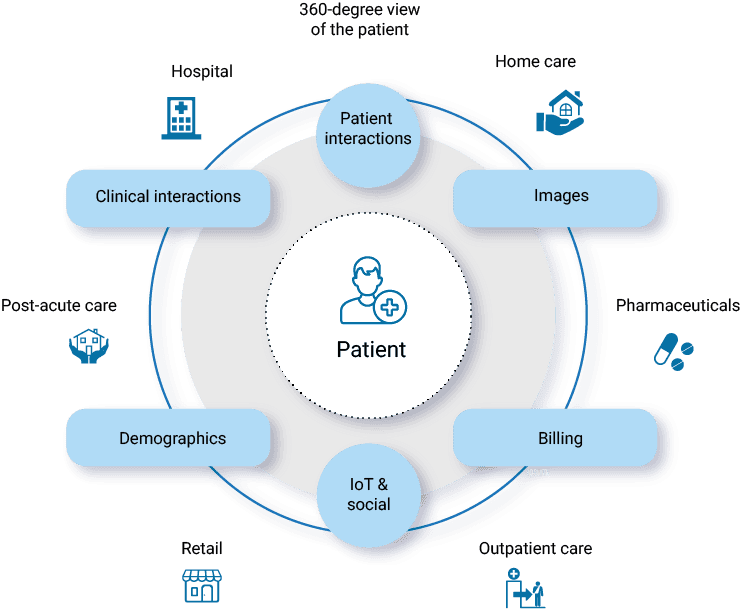- May 5, 2023
- Posted by: Indium
- Category: Industries

A Data Bridge Market Research report suggests that the healthcare information software market will touch USD 53.22 billion by 2029, growing at a CAGR of 11.3% between 2022 and 2029. One of the key growth is the need for faster and more informed decision-making with better and quicker access to clinical records.
Having the right solution will also help with garnering insights from data stored in electronic medical records (EMR). These insights will help with the following:
- Improve patient treatment decisions and deliver better healthcare outcomes.
- Reduce the need to duplicate testing.
- Better diagnosis
- Minimize prescription errors.
- Overall, deliver patient success at lower costs.
This will require a health information exchange that provides healthcare professionals with access to clinical data, public health information, and data on healthcare spending and activity from multiple sources. As patients become the epicentre of the healthcare ecosystem, it is important to have the right engagement apps that help patients have an end-to-end experience on their journey.
Patient 360 – The app built by Indium is precisely focused on that paradigm.

|
||||||||||||||||||||||||||||||
|
||||||||||||||||||||||||||||||
|
||||||||||||||||||||||||||||||
|
Additionally, check out this interesting Success Story on the Decision to Launch the Drug Lifecycle App.
Drive Healthcare Data & Analytics Innovation with Indium Software
Indium Software has been working with clients across the healthcare spectrum, including health-tech firms, ISVs, payers, providers, home health service providers, diagnostics companies, pharmaceutical companies, and biotech companies, for more than 20 years. The healthcare technology services vertical at Indium is one of the fastest-growing practises. It includes:
- Delivering complex, techno-domain projects such as TeleICU applications
- Building data analytics solutions such as patient intelligence from EMR dumps
- Automating the conversion of telehealth interactions between physicians and patients into a claims-submissible medical record
Indium is currently working with several large players across the healthcare ecosystem to enable digital technology enablement such as app modernization, cloud enablement, mobile development, etc. We also deliver core business services such as benefit configuration, claims testing, and Medicare and Medicaid enrolment platform support.
Our capabilities include developing domain-specific solutions leveraging our rich knowledge and experience with the following IP-based solutions:
- iDAF – (Indium Data Assurance Framework) is an all-inclusive solution that accelerates validation of heterogeneous target and source datasets for data quality, completeness, integrity, and consistency.
- AI/NLP platform – report extraction from EMR data and PII masking
We have proven experience in healthcare and are the partner of choice for leading healthcare organisations in their product modernization journeys. We have a formidable team of 250+ techno-domain leaders and SMEs and partnerships with technology leaders such as AWS, GCP, MS Azure, Mendix, and Striim to fast-track your organization’s technology transformation programme.
We work with industry-recognised, in-house solutions to accelerate value delivery, including our home-grown solutions like teX.ai, Gravity, uphoriX, and iBrix, making us highly competitive.
Some of our solutions include:
- Remote Patient Monitoring: Indium developed a telehealth and remote patient monitoring portal and mobile app with a comprehensive clinical workflow, videoconferencing, and a real-time collaborative channel between physicians, carers, and ICU staff.
- Security and Compliance: Healthcare is a highly regulated industry, and there is a strong need to protect patient data. Indium develops secure solutions for permission-based access that meet regulatory and compliance needs.
To learn more about how Patient 360 can benefit your healthcare enterprise
FAQs
Yes, data from all sources are integrated and stored in a common location. Tools such as teX.ai help extract data from paper-based sources and are made available along with data from other sources for a holistic view.
Integrating patient and healthcare data from multiple sources provides healthcare providers with a deeper understanding of patient needs and design personalized care to improve outcome.
Time-consuming and repetitive processes that can be modelled based on reliable data from secure data sources should be automated first.
